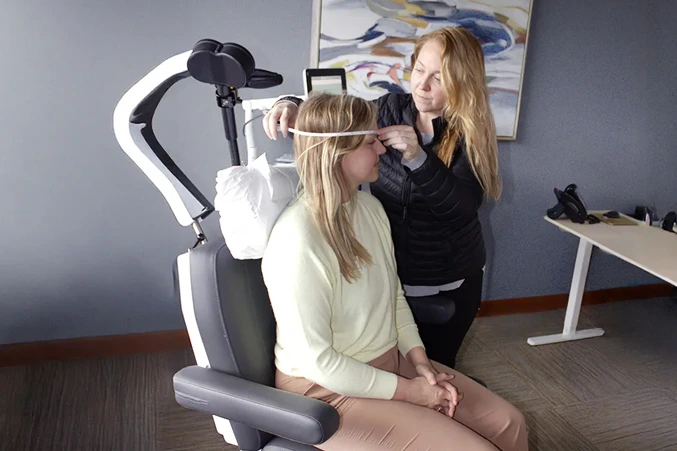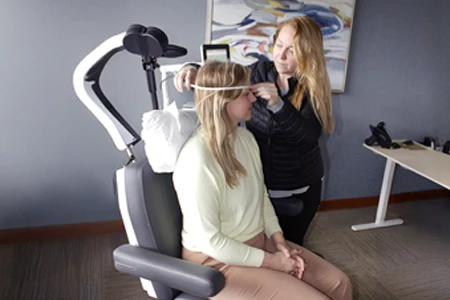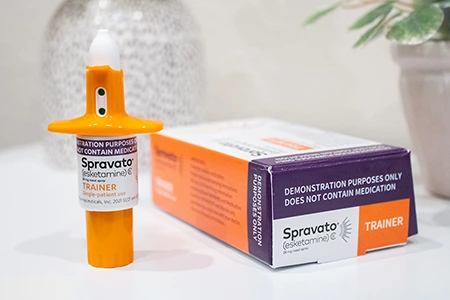Is TMS Therapy Legitimate?
By Dr. Karan Narwal

Transcranial Magnetic Stimulation (TMS) often gets lumped in with other so-called “alternative” treatments, right alongside kale cleanses and essential oils promising to heal your childhood trauma. But here’s the thing, TMS is not the traditional golden goose that big Pharma loves. They know it works, they know it helps and they know it brings revenue. And when I mean they, I mean the corporate and medical community. TMS is real. TMS is happening. TMS is an FDA-approved, scientifically backed, and highly effective treatment for depression and other mental health conditions.
Just imagine if you’ve gone through years of psychotherapy. You’ve been told that you need to eat well, so you only shop at Whole Foods. You’ve been told exercise helps, so you’ve been keeping the gym routine going for over a year. Your last visit with your doctor resulted in a dosage increase with your Lexapro and you’ve been given something to help you sleep. This has been a battle for 6 years. Medication after medication, routine after routine. But that lack of interest in things you love is still existent, perhaps worse. Your therapist says they want to help you but right now feel that my symptoms are making it difficult to benefit from using the skills your taught in therapy. They turn you to a TMS clinic nearby. Mention something about magnets. This sounds crazy. This sounds completely out of a movie. It’s voodoo. You’ve been Googling TMS therapy near me or is TMS legitimate? You’ve been reading forums, asking friends and even searching YouTube. You’re not alone.
So What’s The Science Behind the “Magic
Let’s cut to the chase. TMS is a non-invasive procedure that uses magnetic pulses to stimulate areas of the brain associated with mood regulation, most specifically, the prefrontal cortex. Now if you’re thinking, “Magnetic pulses? Sounds like sci-fi,” well, so did MRIs once upon a time. But just like how an MRI doesn’t teleport you to another dimension, TMS therapy is not pseudoscience; it’s innovative psychiatry at its finest. It’s the use of energy, literally, to create an anti-depressant effect.
The National Institute of Mental Health (NIMH) and numerous research institutions confirm that TMS is an effective alternative for individuals who have tried conventional medication management without success. According to a study published in The American Journal of Psychiatry, approximately 50-60% of patients with treatment-resistant depression respond to TMS, and about 30-40% achieve full remission—as in, depression packs its bags and leaves the premises. Compare that to standard antidepressant medications, which, according to STAR*D trials, have about a 27.5% success rate for those who fail their first prescription. If antidepressants were a batting average, they wouldn’t even make the minor leagues.
If you’ve been asking yourself whether TMS is right for you, we’re here to help you find out. Our care team at Turnwell will walk you through the entire process, answer your questions, and determine if TMS is a safe and appropriate option based on your health history and goals.
Take the Next Step Towards a More Organized and Focused Life
Sioux Falls Office
Sioux Falls, SD 57106
8:00 am — 5:00 pm
Downtown Sioux Falls
Sioux Falls, SD 57104
8:00 am — 5:00 pm
West Des Moines Office
West Des Moines, IA 50266
Friday: 8:00 am — 1:00 pm
Saturday — Sunday: Closed
Rapid City Office
Rapid City, SD 57702
8:00 am — 5:00 pm
Fargo Office
Fargo, ND 58102
8:00 am — 5:00 pm
BLOG
Mental Health Blog
9 Signs You Need a SAD Diagnosis (Not Just the Winter Blues)
As the daylight hours dwindle and temperatures drop, millions of Americans experience a predictable, energy-sapping shift. While many brush off low mood as “the winter blues,” persistently distressing symptoms that recur every year may indicate Seasonal Affective Disorder (SAD), specifically Winter Depression (or Winter-Pattern SAD).
National Grief Awareness Week: 5 Signs Your Grief May Be Complicated
If you’ve been searching for grief and loss therapy because you feel “stuck” in your pain, your healing may require specialized intervention. Recognizing the difference between typical grief and complicated grief is the first step toward getting the right support.
Discover the Power of Psychotherapy
Find support and guidance to understand yourself better and create the life you desire.

Want to become a patient?
By completing this form you are requesting a call back from MWI Health. Please do not send medical information via email. By submitting this email you will reach our HIPAA complaint appointment setting office. We will contact you to discuss scheduling an appointment with one of our providers.




